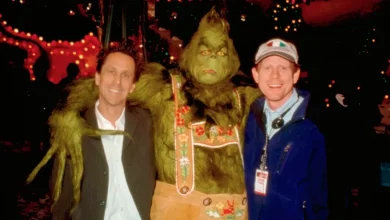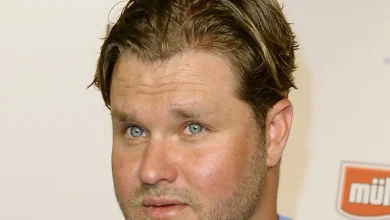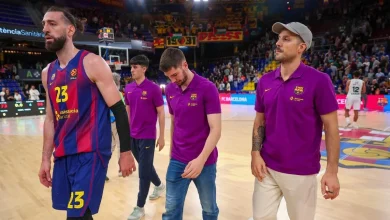Inside the mind of Virgil van Dijk

If Liverpool’s victory over Real Madrid was a statement, Virgil van Dijk was ready to make another one after it.
As he stood alongside Amazon Prime presenter Gabby Logan and ex-player pundits Robbie Fowler, Wayne Rooney, Theo Walcott and Daniel Sturridge for a post-match interview, two moments offered an insight into Van Dijk’s psychology and his attitude to the job of captaining Liverpool.
One was a sharp riposte to Rooney following some public criticism from the ex-Manchester United striker on his podcast. The other concerned his former team-mate Trent Alexander-Arnold, who returned to Anfield for the first time after joining Real Madrid in the summer. Walcott asked Van Dijk whether, ahead of the game, he had chance to speak with someone he had played alongside in Liverpool’s back four for seven years.
His one-word response was emphatic: “No.”
Van Dijk had already fielded questions on Alexander-Arnold’s return after the victory over Aston Villa three days earlier. He admitted there had been little contact between the pair since the right-back’s move to Spain. “Nothing personal,” the 34-year-old told reporters. “I live my life and he lives his life in Madrid.”
His responses, though, appears more of a reflection of his general approach to being a talisman for Liverpool — and the squad’s public-facing figurehead — than any genuine animosity towards Alexander-Arnold.
There have been the odd frosty moments between them, notably during the 2-2 draw with Manchester United in January when Van Dijk berated Alexander-Arnold after a mistake, but that is to be expected at a Premier League club. Sources with knowledge of the situation, speaking on the condition of anonymity to protect relationships, have dismissed any talk of a feud between the pair.
On the last day of the 2024-25 season, Van Dijk was one of the first to embrace him after the final whistle of the 1-1 draw with Crystal Palace signalled the end of his Liverpool career. The captain had also pushed the defender towards the travelling supporters after he had scored the winner in the 1-0 victory at Leicester City in April. The pair embraced briefly after Tuesday’s match, too.
Virgil van Dijk and Trent Alexander-Arnold embrace after Alexander-Arnold’s last appearance for Liverpool (Sebastian Frej/Getty Images)
Van Dijk takes his role as Liverpool captain extremely seriously. He knows he is representing the club as a public figure, and will have known how the majority of supporters feel about Alexander-Arnold’s decision to leave.
He had given a window into his feelings after the 2-2 draw with Arsenal in May, shortly after Alexander-Arnold announced his departure. “For me, there is no other place to be at this point,” Van Dijk told reporters.
Given his attitude to championing Liverpool’s cause at every turn, it would have jarred to hear him speak of being delighted to welcome Alexander-Arnold back to Merseyside. For Van Dijk, he was an opponent who needed to be neutralised.
Van Dijk seems to enjoy being the de facto spokesman for Liverpool’s players. After being appointed captain in July 2023, he decided it was incumbent on him to speak to the media in the mixed zone after every match, regardless of the result. He saw it as a key part of his responsibilities as captain — a departure from the policy of previous skippers, who spoke more sparingly — and it is appreciated by team-mates, who now feel less pressure to speak themselves.
Van Dijk aims to send out the right message and set the tone for the coming days. Last season, the focus was about keeping his team-mates grounded and not making any bold statements given their league position, and preaching the importance of rest and recovery.
With Liverpool’s fortunes having suffered this season, the message has switched. Van Dijk has urged his team-mates to “ignore outside noise” and has attempted to instil a siege mentality among the squad. He is positive and encouraging in his messaging, but also demanding: he can be spiky in the immediate aftermath of defeat and is relentless in the standards he expects himself and others to reach.
“There is a refreshing and inspiring amount of candour, responsibility, hard work, and courage in how Van Dijk operates as a leader,” says sports psychologist Marc Sagal, the founder of The Winning Mind, who has worked extensively with teams in the Premier League and beyond.
(Carl Recine/Getty Images)
“He focuses on process, standards, and collective accountability rather than external approval. He’s remarkably clear about what leadership means to him and this clarity shows in how he handles critique and challenge. He accepts the reality of situations and the criticism that comes along, but he’s equally clear about what he and his team-mates control.”
It does not always make him easy company when results are poor. Van Dijk is close to fellow defender Joe Gomez but has a good working relationship with them all, and can identify when players are struggling. He has taken team-mates out for dinner to learn about their lives and what motivates them.
Those around him say he goes out of his way to help new players settle, offering advice on where to live, schools and places to eat. He has helped Alexander Isak adapt to Merseyside life, and his influence has increased to being involved in convincing players to sign for the club. He spoke to Florian Wirtz when he was considering whether to move to Anfield or Bayern Munich, for example.
His opinion carries weight, with Slot describing him as “the most influential captain” he has worked with as a manager.
“He is one of the few leaders in the world of football,” Slot told Jamie Carragher in an interview for Sky Sports in April. “He knows what he says, he knows how to motivate his team-mates to get the best out of us every single day.”
“There’s something deeply stabilising about the way he carries himself,” adds Sagal. “His sense of identity anchors him. When things get chaotic, he draws strength from his principles and values, and that steadiness lifts those around him.”
Van Dijk sets the standards at Liverpool’s training ground, and he is influential off the field, too: other Liverpool players have followed his lead of building up a personal support team around him, including a chef and physiotherapist. Ryan Gravenberch, for example, credited Van Dijk’s advice about diet and recovery as being key to transforming his fortunes at the club.
Van Dijk sets an example on and off the pitch (Steven Halliwell/MI News/NurPhoto via Getty Images)
There was appreciation, too, for Van Dijk’s handling of the death of Diogo Jota in July. The leadership he showed in the aftermath of the tragedy lifted his standing even further internally at the club, and it was significant that Van Dijk referenced its impact after the 2-1 defeat at Chelsea on October 4. With Liverpool being subjected to increasingly extreme criticism, Van Dijk felt it was the moment to remind the world of the shadow that was still being cast over the club.
“It’s like a brotherhood, isn’t it?” Van Dijk said in an interview with Sky Sports in August. “For me personally, I feel that responsibility for everyone — if I feel like anyone is down or anyone is getting criticised more or whatever, I feel responsible for that, it hurts me as well.”
Van Dijk’s attitude to Liverpool is mirrored in his approach to international commitments with the Netherlands, which he frequently references in media interviews. For him, an international ‘break’ offers little respite: as captain of his country, his duties there are just as onerous as with his club. He is constantly having to think of ways to motivate and inspire team-mates. For example, he wrote a personalised letter to every player and left it on their hotel bed ahead of the last European Championship.
Taking on a prominent role can leave you open to criticism — especially in the Netherlands, where former players tend to be blunt in their appraisals.
Marco van Basten and Ruud Gullit, both legends of the Dutch game, have questioned his leadership and ability. “He makes noise, but doesn’t say anything,” Van Basten told Ziggo Sport in March 2023. “A good captain makes it clear what is going on. He creates chaos that leads to misunderstandings. That is what you, as captain, must prevent.”
Similarly, there was criticism in the Dutch media when Van Dijk offered an unsympathetic appraisal of Matthijs de Ligt’s poor display in a 2-2 draw with Germany in September 2024, saying that his fellow centre-half would “have to learn from this”.
Van Dijk is under scrutiny for club and country (ANP via Getty Images)
Rooney was the latest when he questioned Van Dijk and Salah’s body language on his BBC podcast, The Wayne Rooney Show.
“They’ve signed new deals, but I don’t think they’ve really led that team this season,” Rooney said. “I think body language tells you a lot, and I think we’re seeing slightly different body language from the two of them. They are the top two players in that team and if their body language is not right, that affects everyone else. I might be wrong on this, but if I were a Liverpool fan or the manager, that would be a big concern for me.”
Van Dijk was stung by the suggestion that his effort would have declined simply because he signed a new deal in April. The 34-year-old responded to a questions about Rooney’s comments by calling them “lazy criticism” after the Villa game, and the chance to repeat his message to Rooney’s face on Tuesday was too good to pass up.
“I think if you watched games, then I would definitely take responsibility,” Van Dijk said on live TV. “I think the comment that I signed my new deal and then it was like ‘that is it’ and I let it slide, I think that was a bit… but that’s my personal opinion and we move on.”
It was not the first time Van Dijk had been riled by a former Manchester United player. In December 2023, he bristled at comments from Roy Keane, who had labelled him arrogant after he said “there was only one team trying to win the game” after a goalless draw between Liverpool and United.
Van Dijk, when speaking to Rio Ferdinand on his Rio Meets podcast, admitted he understands that pundits have to sometimes be “more controversial”, otherwise they can “get boring”.
There are occasions when he can bring criticism on himself with his style of defending or his reaction to setbacks. In the recent defeat by United at Anfield, for example, in the second half he appeared to be frustrated by Milos Kerkez after Van Dijk missed his clearance and the ball hit the left-back in the face.
Despite his message of the importance of “blocking out the noise”, Van Dijk is aware of what gets written about him by those covering the club regularly. He has blocked journalists on social media in the past and will sometimes pull them up on something he feels was inaccurate or unfair, albeit often in a good-natured way.
Van Dijk is by no means the only elite player to use a grievance as fuel — Keane, for one, would surely empathise — but his public comments in the last seven days underline that even if he is approaching the twilight of his career, his fire burns brighter than ever.





